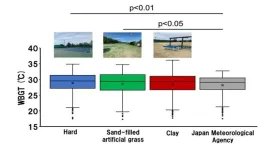(Press-News.org) ARLINGTON, Va. (August 7, 2024) — Family members of patients recently discharged from the hospital may have a higher risk of getting an antibiotic-resistant infection, often called a superbug, even if the patient was not diagnosed with the same infection, suggesting hospitals play a role in the community spread of resistant bacteria, according to study in Infection Control & Hospital Epidemiology, the journal of the Society for Healthcare Epidemiology of America.
When recently hospitalized patients were diagnosed with the superbug — Methicillin-resistant Staphylococcus aureus infection (MRSA) — the risk to relatives living with them was even higher. The longer the relative’s hospital stay, even without a MRSA diagnosis, the higher the risk to family members.
“Patients can become colonized with MRSA during their hospital stay and transmit MRSA to their household members,” said Aaron Miller, PhD, lead researcher on the study and research assistant professor of internal medicine-infectious diseases at University of Iowa. “This suggests hospitals contribute to the spread of MRSA into the community through discharged patients who are asymptomatic carriers.”
Miller recommends hospitals enhance infection control practices, including testing for MRSA colonization, especially at discharge, even with there are no symptoms of infection. He said MRSA colonization and infections could be tracked among hospital patients and their household contacts to identify and mitigate transmission more effectively.
“This important study illustrates the risk of spread of resistant pathogens related to healthcare and highlights the essential importance of core infection practices,” said SHEA President Thomas Talbot, M.D., chief hospital epidemiologist at Vanderbilt University Medical center. Talbot was not involved with the research. “Hand hygiene, environmental cleaning, and standard interventions to reduce Staphylococcal colonization are crucial to preventing the spread of resistant bacteria in healthcare settings,”
MRSA infections are known as superbugs because they do not respond to common antibiotics, making them difficult to treat. MRSA generally occurs in people who have been in a hospital or another health care setting, such as a nursing home, but MRSA also spreads in communities outside the hospital, usually through skin-to-skin contact. Most people with MRSA have no symptoms, but the bacteria can cause painful swelling if it gets under the skin, and it can be deadly if it spreads to other parts of the body, such as blood or lungs.
Researchers used a large database of insurance claims that included 158 million enrollees with two or more family members on the same plan to learn about how MRSA spread to after someone in a household had been in the hospital.
Reviewing 424,512 MRSA cases among 343,524 insured people, the study found 4,724 cases of MRSA being potentially transmitted to a family member from a relative who had recently been in the hospital and had a diagnosis of MRSA. They also found 8,064 potential transmissions of MRSA after the hospitalization of a family member who did not have a MRSA infection.
“It is important not over-emphasize the hospital stay risk,” Miller said. “While we identified a significant risk factor for transmission in the household and community the absolute risk remains relatively low.”
People exposed to a recently hospitalized family member with MRSA were more than 71 times, or 7000%, more likely to get a MRSA infection compared to enrollees who did not have a family member who had been in the hospitalized or exposed to MRSA in the previous 30 days.
Having a family member in the household who was hospitalized but did not have MRSA increased the chances of a relative getting MRSA in the month after discharge by 44%.
The more time the family member spent in the hospital, the higher the likelihood someone in their household would get MRSA. If the patient was in the hospital one to three days in the previous month, the chance of a relative getting MRSA increased by 34% compared to people with no recent hospitalizations in their household. If a family member was hospitalized for four to 10 days, the chances of MRSA infection in a relative were 49% higher, and with hospitalizations longer than 10 days the odds of relative in the same household getting an infection rose by 70% to 80%.
Other factors associated with MRSA infections among household members included number of other illnesses, prior antibiotic usage, and the presence of young children in the family.
The study, “Hospitalizations among family members increase the risk of MRSA infection in a household,” was published online in Infection Control & Hospital Epidemiology on August 7.
###
About ICHE
Published through a partnership between the Society for Healthcare Epidemiology of America and Cambridge University Press, Infection Control & Hospital Epidemiology provides original, peer-reviewed scientific articles for anyone involved with an infection control or epidemiology program in a hospital or healthcare facility. ICHE is ranked 24th out of 94 Infectious Disease Journals in the latest Web of Knowledge Journal Citation Reports from Thomson Reuters.
The Society for Healthcare Epidemiology of America (SHEA) is a professional society representing more than 2,000 physicians and other healthcare professionals around the world who possess expertise and passion for healthcare epidemiology, infection prevention, and antimicrobial stewardship. The society’s work improves public health by establishing infection-prevention measures and supporting antibiotic stewardship among healthcare providers, hospitals, and health systems. This is accomplished by leading research studies, translating research into clinical practice, developing evidence-based policies, optimizing antibiotic stewardship, and advancing the field of healthcare epidemiology. SHEA and its members strive to improve patient outcomes and create a safer, healthier future for all. Visit SHEA online at shea-online.org, facebook.com/SHEApreventingHAIs and twitter.com/SHEA_Epi.
END
With rising global temperatures due to global warming, the risk of heat strokes has increased and is expected to grow even further. This is particularly troubling for athletes participating in competitive sports. In tennis, multiple matches are played daily, lasting up to five hours. Playing such matches in sweltering conditions could be highly detrimental.
The Tokyo Olympic Games in 2021 faced extremely hot conditions with many players calling for appropriate countermeasures. Consequently, the International Tennis Federation (ITF) formulated and issued the “Extreme Weather Policy” at the Tokyo Olympics to manage matches based ...
Everyone gets sleepy at work from time to time, especially after a big lunch. But for people whose jobs involve driving or working with heavy machinery, drowsiness can be extremely dangerous — if not outright deadly. Drowsy driving contributes to hundreds of fatal vehicle accidents in the U.S. each year, and the National Safety Council has cited drowsiness as a critical hazard in construction and mining.
To help protect drivers and machine operators from the dangers of drifting off, engineers at the University of California, Berkeley, have created prototype earbuds that can detect the signs of drowsiness ...
Boston – Vorasidenib has been approved by the U.S. Food and Drug Administration (FDA) for patients with Grade 2 gliomas with IDH1 or IDH2 mutations.
Based on evidence from the INDIGO clinical trial, a global phase 3, double-blinded, randomized clinical trial, vorasidenib more than doubled progression-free survival and delayed the need for treatment with radiation and chemotherapy for patients with Grade 2 IDH-mutant glioma after surgery to remove the tumor. INDIGO was the first phase 3 clinical trial of a molecularly targeted therapy for IDH-mutant glioma.
“The INDIGO trial ...
It may now be time to ban artificial stone—a firm favourite for kitchen worktops in the UK— to ward off the incurable lung disease caused by its manufacturing and fitting, say a team of doctors in the journal Thorax after treating the first 8 cases of artificial stone silicosis reported in the UK.
Silicosis is caused by breathing in crystalline silica dust, and millions of people around the world are at risk of developing it as a result of their jobs in mining, quarrying, stone-cutting ...
The UK and the European Union should follow Australia’s lead and ban the kitchen worktop favourite and cause of irreversible and rapidly progressive lung disease—artificial stone siliicosis—urge researchers in an editorial, published online in Occupational & Environmental Medicine.
And until a ban comes into force, all possible control measures should be legally enforced to minimise workers’ exposure to the harmful crystalline silica dust generated during its manufacture and fitting, insist the authors.
Artificial stone (also known as engineered stone) is widely used for surfaces ...
Renewed efforts to reduce child poverty in England between now and 2033, such as removing the 2-child limit on child benefit, would significantly boost several aspects of child health and narrow health inequalities across the country, finds research published online in the Journal of Epidemiology & Community Health.
Tackling it would substantially cut the number of infant deaths and children in care, as well as rates of childhood nutritional anaemia and emergency admissions, with the most deprived regions, especially ...
The International Olympic Committee (IOC) should cut its ties with Coca Cola in the best interests of athletes, spectators, and the planet, urge Trish Cotter and Sandra Mullin of the international public health organisation, Vital Strategies, in an editorial to be published shortly in the open access journal BMJ Global Health.*
The company’s sponsorship forces athletes to implicitly endorse unhealthy sugary drinks and provides Coca Cola with elite access to political and corporate leaders to exert its influence, insist the authors.
Coca Cola has sponsored the Olympic Games for almost 100 years, they note. And there’s ...
Today, Bloomberg Philanthropies announced a gift of $5 million in seed funding to support the creation of the Xavier Ochsner College of Medicine (XOCOM), a newly established medical school in New Orleans founded by Xavier University of Louisiana and Ochsner Health.
Earlier this year, Xavier University of Louisiana, a historically Black college and university (HBCU) with a strong track record of sending graduates into the medical field, and Ochsner Health, the Gulf South’s leading not-for-profit health system with a long academic ...
A recent study by László Zsolt Garamszegi from the Institute of Ecology and Botany, Centre for Ecological Research, Hungary, and Niclas Kolm from the Department of Zoology, Stockholm University, Sweden, challenges the long-held notion that domestication is the primary driver of reduced brain size in domesticated animals, specifically dogs. The study employs a phylogenetic comparative method to analyze whether the domesticated dog (Canis familiaris) exhibits a uniquely small brain relative to its body size compared to other canid species.
The prevailing belief has been that domestication leads to a significant ...
*Note this is an early release from the Annual Meeting of the European Association of the Study of Diabetes (EASD 2024, Madrid, 9-13 September). Please credit the meeting if using this material*
Women who develop gestational diabetes are not more likely to go on to be diagnosed with breast cancer, according to a study of almost three-quarters of a million mothers to be presented at this year’s Annual Meeting of the European Association for the Study of Diabetes (EASD) (Madrid, 9-13 September).
Gestational diabetes, a type of diabetes that can develop during ...



